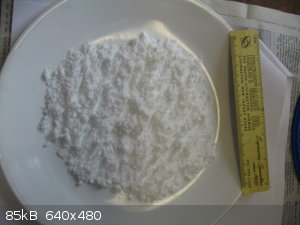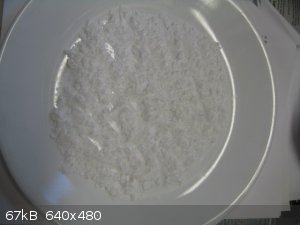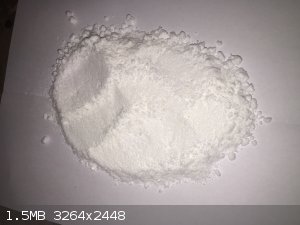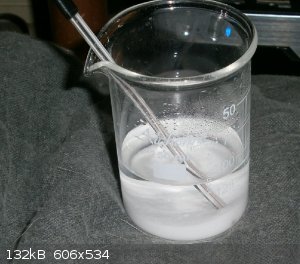| Pages:
1
2 |
PHILOU Zrealone
International Hazard
    
Posts: 2893
Registered: 20-5-2002
Location: Brussel
Member Is Offline
Mood: Bis-diazo-dinitro-hydroquinonic
|
|
Quote: Originally posted by Hawkguy  | | Okay so after doing this a few times, I noticed that the yields are low, as warned. Is it possible to distill Hydrazine out of the solution (After
boiling off water) after the neutralization with Hydrochloric Acid? Or will Hydrazine Hydrochlorides have been formed after the HCl addition, making
it difficult to distill? |
Hydrazine distillation is bad news...
-risk of fire (or explosion) due to the endothermic nature of N2H4
-corrosive to glass...will ruin your distillation setup
HCl addition will indeed form N2H4.HCl what is non volatile...and this might be good for concentration by evaporation.
Note that HCl will not displace the H2SO4 if you start from N2H4.H2SO4!
PH Z (PHILOU Zrealone)
"Physic is all what never works; Chemistry is all what stinks and explodes!"-"Life that deadly disease, sexually transmitted."(W.Allen)
|
|
|
Magpie
lab constructor
    
Posts: 5939
Registered: 1-11-2003
Location: USA
Member Is Offline
Mood: Chemistry: the subtle science.
|
|
I'm preparing to make some hydrazine sulfate.
To do this I bought a fresh gallon of 13.5% swimming pool grade aqueous NaOCl, "Hasachlor" brand. I bought this about 1 month ago. Knowing it can
lose strength, especially in the summer heat, I titrated a sample with 3.96M sodium thiosulfate. I had made up this thio 7 years ago and stored it in
an amber bottle with a ptfe seal (Qorpak, 125ml, wide-mouth). The NaOCl strength was found to be a disappointing 8.5%.
To check the concentration of my thio I titrated it against some 0.165M Cu(NO3)2 made with copper wire, also 7 years ago. The result indicated 0.169M
Cu(NO3)2. This verified my thio. This amazed me.
[Edited on 20-7-2015 by Magpie]
[Edited on 20-7-2015 by Magpie]
[Edited on 20-7-2015 by Magpie]
The single most important condition for a successful synthesis is good mixing - Nicodem
|
|
|
Magpie
lab constructor
    
Posts: 5939
Registered: 1-11-2003
Location: USA
Member Is Offline
Mood: Chemistry: the subtle science.
|
|
Here's pictures of the hydrazine sulfate I made yesterday. The pictures show the product before and after an all day air dry. The yield was 39.8g
for a %yield of 55.6% based on NaOCl.
I made another batch today and still need to make one more. It was 90°F in the lab today and I'm worn out so will take tomorrow off.
 
The single most important condition for a successful synthesis is good mixing - Nicodem
|
|
|
subsecret
Hazard to Others
  
Posts: 424
Registered: 8-6-2013
Location: NW SC, USA
Member Is Offline
Mood: Human Sadness - Julian Casablancas & the Voidz
|
|
Sorry to revive this old thread...
Could someone offer some advice on the disposal of hydrazine salt solutions? Would nitrous acid solve the problem by first forming hydrogen azide and
then reacting with it?
Fear is what you get when caution wasn't enough.
|
|
|
UC235
National Hazard
   
Posts: 565
Registered: 28-12-2014
Member Is Offline
Mood: No Mood
|
|
Quote: Originally posted by subsecret  | Sorry to revive this old thread...
Could someone offer some advice on the disposal of hydrazine salt solutions? Would nitrous acid solve the problem by first forming hydrogen azide and
then reacting with it? |
Make them alkaline to produce free hydrazine and add bleach. Nitrogen gas will form copiously.
|
|
|
NeonPulse
Hazard to Others
  
Posts: 417
Registered: 29-6-2013
Location: The other end of the internet.
Member Is Offline
Mood: Isolated from Reality! For Real this time....
|
|
Well I just have to say thanks for posting a smaller scale procedure and your results of it. I have been wanting to perform this synthesis for a while
now and after considering how expensive hydrazine sulfate is vs the cost of components to make it, I carried out this synthesis last night with
pleasing results. Following this synthesis to a T except for having 12.5% pool hypochlorite and adjusting the other reagents accordingly got me a
yield of 48.97g of crispy Snow White hydrazine sulfate crystals. The whole process went off without any problems at all and was well under control
except briefly when my flask foamed up s little during the neutralisation with HCl. Otherwise perfect.
[Edited on 19-12-2015 by NeonPulse]

|
|
|
Magpie
lab constructor
    
Posts: 5939
Registered: 1-11-2003
Location: USA
Member Is Offline
Mood: Chemistry: the subtle science.
|
|
That's a great yield - nice going.
The single most important condition for a successful synthesis is good mixing - Nicodem
|
|
|
Hawkguy
Hazard to Others
  
Posts: 326
Registered: 10-10-2014
Location: British Columbia (Canada eh!)
Member Is Offline
Mood: Body is Ready
|
|
After seeing a patent advertizing a >80% yield earlier, i can just imagine the US patent show where they come up with this shit. "For my next
trick, I will pull an entire patent for Hydrazine Sulfate.... Out of my ass."
|
|
|
XeonTheMGPony
International Hazard
    
Posts: 1641
Registered: 5-1-2016
Member Is Offline
Mood: No Mood
|
|
How does one test for hydrazine with out silver or much of any thing ells?
|
|
|
j_sum1
Administrator
       
Posts: 6372
Registered: 4-10-2014
Location: At home
Member Is Offline
Mood: Most of the ducks are in a row
|
|
hydrazine can make a copper mirror. I am yet to try it but it seems like as good a test as any.
|
|
|
XeonTheMGPony
International Hazard
    
Posts: 1641
Registered: 5-1-2016
Member Is Offline
Mood: No Mood
|
|
ya but I'd need a copper compound, less I can use bare copper! so far 10 grams did not fully dissolve fully in 100g of distilled water. very nice free
flowing crystals.
Basically I wasn't planning to make any such thing, but got bored and you-tube inspired, so now just need to test it!

[Edited on 24-4-2016 by XeonTheMGPony]
|
|
|
j_sum1
Administrator
       
Posts: 6372
Registered: 4-10-2014
Location: At home
Member Is Offline
Mood: Most of the ducks are in a row
|
|
Copper sulfate would be the go-to for this one. But I think any Cu(II) salt would do. Copper wire and nitric acid or even vinegar will get you on your
way.
That said, I am, to quote chemplayer, a hydrazine virgin. There are others around whose advice is likely to be a lot better than mine.
|
|
|
PHILOU Zrealone
International Hazard
    
Posts: 2893
Registered: 20-5-2002
Location: Brussel
Member Is Offline
Mood: Bis-diazo-dinitro-hydroquinonic
|
|
Quote: Originally posted by XeonTheMGPony  | ya but I'd need a copper compound, less I can use bare copper! so far 10 grams did not fully dissolve fully in 100g of distilled water. very nice free
flowing crystals.
Basically I wasn't planning to make any such thing, but got bored and you-tube inspired, so now just need to test it!
[Edited on 24-4-2016 by XeonTheMGPony] |
Take an aliquot (20 mg or so) of your batch of N2H6SO4 in a test tube, dissolve into 1ml of demineralized water, add some soluble copper (II) salt
(also about 20 mg) dissolved into demin water too...allow it to fall drop by drop into the test tube.
Blue CuSO4, blue Cu(NO3)2 or green CuCl2 will expell N2 bubbles, the solution will turn black, brown with a spongy precipitate of solid Cu or Cu2O.
Ammonium salts (sulfate, nitrate or chloride) will not give any precipitate nor bubbling.
Do it on an aliquot of your batch and not on all your batch since Cu(2+) and other metals do have a catalytic effect on the decomposition of
hydrazine...so a minute amount may ruin a big deal of your batch gained after some intensive labour.
I would test it on a smarter way via mild basification with NaOH or Ca(OH)2 saturated solution (the later will precipitate some CaSO4 so filtrate).
N2H6SO4 + NaOH --> N2H4 + NaHSO4 + H2O
N2H6SO4 + 2NaOH --> N2H4 + Na2SO4 + 2H2O
N2H6SO4 + Ca(OH)2 --> N2H4 + CaSO4(s) + 2H2O
Then introduction drop by drop of green solution of Ni(NO3)2 or of red solution of Co(NO3)2.
The first will give a blue colored precipitate that upon agitation turns pink lilac; the second one will give a peach-light brown precipitate.
Ni(NO3)2 + 3 N2H4 --> Ni(N2H4)3(NO3)2 (pink clay like precipitate)
Co(NO3)2 + 3 N2H4 --> Co(N2H4)3(NO3)2 (light peach-brown clay like precipitate)
Both precipitate are safe energetic materials...once dry they burn when exposed to a naked flame like black powder in the open, but detonate when in
large quantity (self confinement) or in minute quantity when confined into aluminium wrapping foil.
Beware 50 mg wrapped into several layers of Al foil and trown in a camp fire will make after a few seconds delay a 20-40 cm diameter fireball with a
loud report and will spray burning wood/charcoal meters away!
[Edited on 24-4-2016 by PHILOU Zrealone]
PH Z (PHILOU Zrealone)
"Physic is all what never works; Chemistry is all what stinks and explodes!"-"Life that deadly disease, sexually transmitted."(W.Allen)
|
|
|
XeonTheMGPony
International Hazard
    
Posts: 1641
Registered: 5-1-2016
Member Is Offline
Mood: No Mood
|
|
That's what I figured, need to go and pick up some copper sulfate. I was planing to stock up on that sort of stuff befor making it but like I say
sever boredom (Crappy weather) + you tube and I happened to have the supplies for the synth, must say it went flawlessly.
I used chem players vid, divided the measures in half, Kept every thing well chilled during the mixing stages.
once the first half of the reaction was don I proceeded to the hot stage. putting the 500Ml beaker into a large water bath that was prewarmed, I
slowly nudged it to 85c, once it hit 80c I started the count down to 5 minutes.
After as per instructions I set it aside to cool slowly, once just warm to the touch I put it in the fridge till cold (At this point my 50/50 water to
sulfuric acid had been in the freezer for an hour.
I put the 500Ml beaker into an ice bath and started the finale stage of adding in the dilute acid to the mother liqueur to precipitate out the
hydrozine.
Once the neutralization had finished for the basses the Hydrozine sulfate immediately started to fall out as sulfate with each drop! Was perfect run.
[Edited on 24-4-2016 by XeonTheMGPony]
|
|
|
XeonTheMGPony
International Hazard
    
Posts: 1641
Registered: 5-1-2016
Member Is Offline
Mood: No Mood
|
|
Well they only sell copper sulfate by the 20 pound pail here so I made some, and after that was don I tested it, and I do indeed have Hydrazine
sulfate! Copper precipitated out second the drop mixed!
I am still drying the crystals so not sure of exact yield will report weight once fully dried
|
|
|
otonel
Hazard to Self
 
Posts: 84
Registered: 9-4-2005
Member Is Offline
Mood: No Mood
|
|
If I want to make hydrazine sulphate and I have hydrazine 40% and sulphuric acid 90% what is amounts of reactants and how risky is to make that
synthesis?
|
|
|
j_sum1
Administrator
       
Posts: 6372
Registered: 4-10-2014
Location: At home
Member Is Offline
Mood: Most of the ducks are in a row
|
|
Let's see if I have this straight.
You want to play with something as hazardous as hydrazine and you have some on hand.
And you have so much experience that you need to ask about stiochiometry.
Keep it in the jar. You will do yourself some damage.
Normally hydrazine sulfate is the safe route to in situ hydrazine. You don't want to go the other way round.
|
|
|
otonel
Hazard to Self
 
Posts: 84
Registered: 9-4-2005
Member Is Offline
Mood: No Mood
|
|
N2H4 + H2SO4 = N2H6SO4
NH2NH2 + H2SO4 --> NH2NH2·H2SO4 Equation is balanced.
It is easy for me to buy hydrazine hydrate but I don`t want to use as reactant in open space so I decide to synthesis hydrazine sulfate . For that I
want to build a glove box https://www.instructables.com/id/DIY-Glove-Box/ and my big problem is to separate the sulfate because is solubility in aqueous solution.
You have right about the hazard of hydrazine and I want to synthesis the hydrazine sulfate to keep it safe and almost the reactions used in tutorials
are with that stuff.
|
|
|
DavidJR
National Hazard
   
Posts: 908
Registered: 1-1-2018
Location: Scotland
Member Is Offline
Mood: Tired
|
|
I did this using commercial 40% hydrazine hydrate. Use a slight excess of sulphuric acid to ensure complete conversion. Dilute the acid to 50% by
weight first and prechill the acid and hydrazine (otherwise it is too violent). Add the acid dropwise with stirring. Precipitate will form but will
redissolve at first. Once addition is complete there will be a persistent precipitate and the solution will be quite warm (so fume hazard during
addition). Allow to cool, filter, wash crystals with distilled water, and dry.
|
|
|
otonel
Hazard to Self
 
Posts: 84
Registered: 9-4-2005
Member Is Offline
Mood: No Mood
|
|
Thank you for the answer , very useful for my experiment
[Edited on 5-12-2019 by otonel]
|
|
|
Herr Haber
International Hazard
    
Posts: 1236
Registered: 29-1-2016
Member Is Offline
Mood: No Mood
|
|
LOL
The spirit of adventure was upon me. Having nitric acid and copper, I had only to learn what the words 'act upon' meant. - Ira Remsen
|
|
|
ManyInterests
National Hazard
   
Posts: 966
Registered: 19-5-2019
Member Is Offline
|
|
This, and the video on YouTube(link: https://youtu.be/K4p8zHuPVIM), is one of the clearest and best I have ever seen for making Hydrazine sulfate. I'm prepping to make some at the
moment as I experimented with a (superbly rudimentary) outdoor fume hood to protect myself against toxic gasses.
But I have one question: The HCI you use. I have muriatic acid from a hardware store that is stated to be 31.25%. Would it be useful as is or would it
require some kind of purification in order to work?
|
|
|
B(a)P
International Hazard
    
Posts: 1139
Registered: 29-9-2019
Member Is Offline
Mood: Festive
|
|
If you think your HCl had significant impurities then avoid using it otherwise it may negatively impact your yield. The gelatine will only go so far
in preventing the degradation of the hydrazine. If you have sulfuric acid of good purity I see no reason why you couldn't use that for neutralisation
and formation of hydrazine sulfate. I have done this reaction and I can't remember if I did add I have suggested advice or if I used technical grade
HCl. Unfortunately my lab notes are in storage.
|
|
|
ManyInterests
National Hazard
   
Posts: 966
Registered: 19-5-2019
Member Is Offline
|
|
I have little question about the purity of my sulfuric acid. While I can't measure the density precisely (my scale only goes to 0.01 grams. As you
know, we need a 0.001 gram precision for an accurate estimate) I can eyeball it well enough. All of the discoloration is gone and it is a very thick,
syrupy liquid.
One thing that has delayed my experiment is realizing that I need to recrystallize my urea. I have urea from a pair of cold packs and they're in prill
form. Right now I'm doing the final drying in my oven to get rid of any and all of the denatured ethanol I used. I think my end product will be too
high a yield, but I haven't weighed all of it yet. The cold pack only said it contained urea and water and nothing else (the water is in the little
baggy that you break to activate the urea).
Edit: Scratch the part about the urea. It's fine. I followed the instructions posted on another thread and my yield was roughly the same. I believe I
have a nice pure product. Or at least pure enough for my hydrazine sulfate synthesis.
[Edited on 27-10-2021 by ManyInterests]
|
|
|
| Pages:
1
2 |